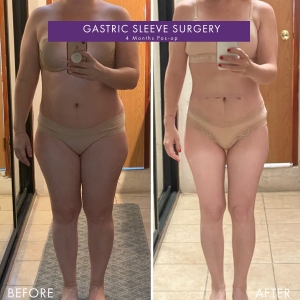Gastric Sleeve vs Gastric Bypass
Thanks to bariatric surgery, patients can finally beat obesity and take back their health with a minimally invasive yet effective procedure. When considering bariatric or weight loss surgery, as it’s often called, you’ll be happy to know that you can choose the exact surgery you’re getting. The final decision is dictated by your health and what you and your bariatric surgeon decide is best for you.
Let’s discuss the main differences between two of the most popular procedures available: Gastric Bypass and Gastric Sleeve Surgery.
When a patient has decided to explore bariatric surgery for weight loss, we often get the question: which one is better? Is a gastric bypass better than a gastric sleeve? What are the pros and cons of a gastric sleeve vs those of a gastric bypass? After talking with our talented bariatric surgeons, we learned that there simply isn’t a ‘best’ bariatric surgery, rather a ‘better bariatric surgery for you.’
What is Gastric Bypass?
During a gastric bypass, your bariatric surgeon will reduce the size of the functional area of your stomach, leaving you with a stomach pouch. After doing this, the doctor attaches a middle section of your small intestine to your new small stomach pouch, bypassing a significant part of your small intestine. The bypassed section of the intestine is responsible for absorbing both nutrients and calories. This really differentiates a gastric bypass from a gastric sleeve.
How does a Gastric Bypass help you lose weight?
A gastric bypass will help you lose excess weight on three different levels: a restrictive level, a malabsorptive level, and a metabolic level. In simpler terms, this means that:
- The restrictive level limits the amount of food you can consume.
- The malabsorptive level limits the calories and nutrients your body actually absorbs.
- The metabolic level reduces the level of hunger-inducing hormones and increases the sensation of satiety even after small meals.
What are the main benefits of a Gastric Bypass?
- The gastric bypass has been performed for decades, making it more of ‘routine’ surgery. This is particularly the case in patients with a BMI of 35-40.
- By bypassing the intestines, you get a malabsorptive effect, something that cannot be achieved with a Gastric Sleeve.
- A Gastric Bypass offers the unique benefit of helping in the remission of diabetes type 2. Since a portion of the small intestine is bypassed, the production of GLUT-1, the molecule that optimizes the use of glucose, decreases, basically curing diabetes.
- Patients lose weight incredibly fast, usually between 60% and 80% of their weight. This is great when it comes to beating not only obesity but obesity-related diseases, such as diabetes and hypertension. However, losing weight so fast can cause saggy skin. (Nothing that couldn’t be fixed with post-weight loss plastic surgery though!)
What is Gastric Sleeve?
During a gastric sleeve surgery, your surgeon will eliminate about 70 to 80% of your stomach. This will leave you with a ‘sleeve’ shaped stomach pouch. Your small intestine will keep on doing the same functions as before and no portion of it is bypassed.
How does a Gastric Sleeve help you lose weight?
A gastric sleeve will help you lose excess weight on two different levels: a restrictive and a metabolic level. Just as the gastric bypass:
- A restrictive level limits the amount of food you can ingest because a very large portion of the stomach is removed.
- The metabolic level, because the portion of your stomach that is removed is responsible for producing ghrelin. The less ghrelin you produce, the less hungry and more satiated you’ll feel throughout the day.
What are the main benefits of a Gastric Sleeve?
- A Gastric Sleeve is naturally less invasive, making it much safer for patients who have a BMI of 40 or higher.
- While still losing up to 80% of the weight, causing less saggy skin. Saggy skin is a major concern for most bariatric patients after concluding their weight loss journey.
- By not having a malabsorptive effect, patients who get a gastric sleeve don’t have such a high chance of developing nutrient or vitamin deficiencies. This, however, can be controlled if you follow your surgeon’s dietary guidelines after the surgery.
- Has a comparable metabolic effect to bypass, also helping in the remission of chronic health problems related to obesity, such as Diabetes Mellitus type 2, high blood pressure, high cholesterol, high triglycerides, obstructive sleep apnea, depression, arthritis, etc.
Gastric Bypass vs Gastric Sleeve…which one is better?
With both surgeries, patients lose up to 80% of their weight in the first year. Another thing that both gastric bypass and gastric sleeve surgery have in common is the commitment needed from the patient. Patients must follow a healthy diet plan and exercise regularly in order to effectively lose weight and keep it off.
You might be the perfect candidate for a gastric sleeve, or you might be the perfect candidate for a gastric bypass. Both surgeries have important pros and cons. Our advice? Do more research than you think you should. Discuss any doubts you have with your bariatric surgeon and evaluate which surgery, a gastric sleeve or a gastric bypass will help you beat obesity in the safest most effective way possible.
Call us now at 1 (619) 610-1667 to schedule a one-on-one consultation with one of VIDA Bariatrics’ highly skilled bariatric surgeons. Let’s beat obesity once and for all!










